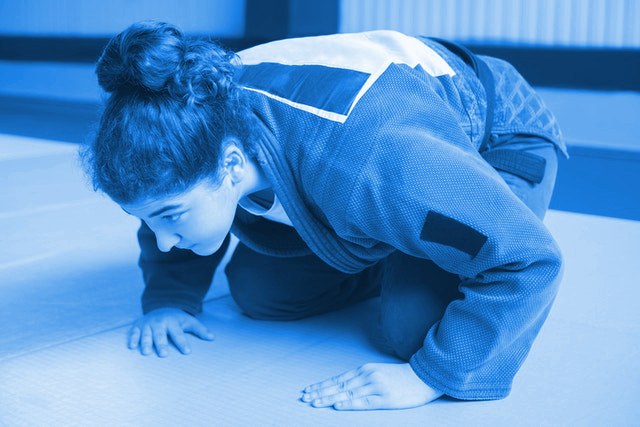Judo allows to develop various dimensions of the being. Let us see what they are.
Character
The purpose of judo is to improve the character of the practitioner by the assimilation of a certain number of values. If the ju jitsu from which it emanates was exclusively an art of combat to defend oneself and to overcome one’s opponent, judo, on the contrary, has a more moral dimension. The idea here is not to kill one’s enemy in the most efficient way as the samurais did by using ju jitsu, but rather to kill the vulgar being in us. Judo itself is a school of nobility of character. It lasts a lifetime. There is no time limit in learning when one is striving for moral perfection. Of course, the ethical dimension is not the one that is most implicit when one begins, yet it is the one towards which one moves as the years go by. There are different ways to assimilate the moral values of judo through the practice of this sport. First of all, the discipline implied by judo starts a process of education. The conveniences and uses of the practice require an appropriate attitude for the good progress of the sessions.
The martial values of judo
If judo is not a martial art with an assassination vocation as ju jitsu was, it has nevertheless not lost the values of the distant samurais. What are they?
Gi: The righteousness and the sense of duty
The judoka must behave with rigor and accomplish his mission with an acute sense of justice. This implies to always weigh the pros and cons, not to be egoistic because it would mean to see first his own interest before the one of the others and one would thus lose this spirit of equity. A sense of duty requires knowing how to distinguish between good and bad actions. A person who acts with duty puts aside his ego to serve a cause greater than himself.
Yu: Courage
Judo, through the efforts it implies and the necessary conflict it suggests, allows one to develop courage. Courage is neither more nor less than acting with a force – love – that allows one to overcome dangers. Courage is learned like any quality of the heart. It is through the repetition of overcoming one’s own fear that one learns to develop courage. It works like a muscle that grows as it encounters and overcomes difficulties.
Jin: Kindness and compassion
Courage without kindness turns a person into a thick brute. Nobility of heart requires one to be firm and courageous with the strong, magnanimous with the needy. Compassion is feeling the emotions of others and acting accordingly. Being benevolent implies cultivating a certain harmony and friendship with those around us. To be effective, a sword must remain quiet in its scabbard most of the time, and so must a judoka: his fighting spirit is expressed only in rare moments that require it. The rest of the time, he must be helpful and humble with people.
Rei: Politeness and respect
A judoka is a velvet glove in an iron hand. His words and attitude indicate the quality of his character. At no time should he be presumptuous or disrespectful to others. This would be contrary to his moral code, which requires him to behave courteously and with gravity. Politeness is a way of showing respect as well as keeping a certain distance that allows one to inspire respect in return.
Makoto: Sincerity and truth
Judo is the way of suppleness (its etymological meaning in Japanese), but it is also the way of the search for truth through the harmonization of the body with the heart and mind. Truth is an intimate experience that can be taught through the senses rather than through intellectualization. Because Judo is primarily a search for balance of body and mind, it necessarily involves attaining a certain degree of truth which can take many forms, sincerity being one of them. It is inconceivable to live the truth without expressing oneself with sincerity.
Meiyo : Honor
Honor is a quality that every child is born with. Through a form of corruption, the child can be led to lose this value. Judo aims to restore this essential virtue, which functions as a kind of emanation and finds its source in the practice of the above principles.
Chugi or chu: Loyalty
Loyalty is also the consequence of all the values mentioned above. Someone who learns to improve himself, to recover the natural qualities of the heart that he had lost thanks to his sensei (his martial arts master), can only be grateful to him and to his art. The gift that one receives through the practice of judo can only give rise to a spirit of loyalty in order not to break the relationship thus created.
Technique
Technique is another aspect of judo. A good judoka will be recognized as such by his character, then by the technique he has acquired. It allows him to gain in confidence and in body harmony, and it gives him this identity of judoka: a judoka is someone who knows the techniques of judo. However, one can come to forget the techniques which one learned whereas it takes more time to forget the values which one inculcated.
The physical
The physical is the most superficial dimension of the practice of judo. It can correspond to the endurance, the physical strength, the musculature that one develops. In the long run, all these qualities can disappear. They are easier to acquire, but also easier to lose. It is nevertheless true that a beginner will be attracted by the physical, which is the door to the technique, which will open his eyes to the development of his moral values






